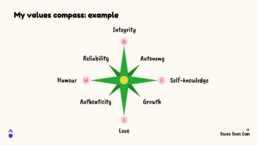In our journey through our careers and lives, we often find ourselves at crossroads, facing decisions that shape our personal and professional paths. One powerful tool that I’ve developed in navigating these choices is what I call the “Values Compass.” This concept has been a guiding light for me and many of those I’ve worked with, helping us align our actions with our core beliefs and expectations. It is one of the many powerful tools I share in the Being Your Best, Doing Your Best course that I’ve developed for Huh Academy: https://huhacademy.com/courses/18-byb-dyb-cohort-24-25/
You can hear me talk through this activity and other activities from the course with Mary Myatt for FREE here: https://huhacademy.com/intro-webinar/18-byb-dyb/
What is the Values Compass?
The Values Compass is a personal collection of principles that guide your decisions, fuel your passions, and define what you stand for. It’s not just about what you believe in, but also what you expect from others and the organisations around you.
Why is it Important?
When we live and work in environments that reflect our values, we thrive. Conversely, when we find ourselves in situations that challenge our moral compass, it can significantly impair our wellbeing – mentally and sometimes even physically. I’ve experienced this firsthand, and it’s why I’m passionate about sharing this concept.
Creating Your Own Values Compass
Here’s how you can create your own Values Compass. Use this list of values (generated from my work with educators at all levels over the last five years) to help you – this list isn’t exhaustive, so feel free to suggest your own values.
- List Your Top Eight Values: Think about the principles that guide you most strongly. You can choose a specific context if you like – as a parent, educator, professional, etc. You don’t have to list them in any particular order at this stage.

- Identify Your North Star: Draw a basic compass (or print this one). If you could only choose one value, what would it be? This becomes your “North” on your compass. Write it above the ‘north’ point. For me, it’s integrity. Nothing hurts more than having my integrity questioned or when someone makes unfounded assumptions about me.

- Define Your South: This is your second strongest value. For instance, I might choose reliability. It’s something I’ve had to work on, but it means a lot to me, and I expect it from others too.
- Choose Your East and West: These could be contrasting values that don’t necessarily sit comfortably together. For example, I might put empathy in the East because I often experience intense empathyfor others. In the West, I might place excellence, as I always strive to do my best.
- Fill in the Remaining Directions: Place your other values in the remaining spots on your compass, considering how they relate to each other. Here’s an example:
Applying Your Values Compass
Once you’ve created your Values Compass, use it as a tool for reflection and decision-making:
- Hold it up against challenging situations you face. What does that feeling of frustration or dissonance tell you about your values?
- Use it to analyze situations where you’ve thrived or had the impact you wanted.
- Share it with your team or family to foster understanding and alignment.
Remember, there’s no wrong answer. Your Values Compass is unique to you and can evolve over time.
Creating and using a Values Compass has been transformative for me, both personally and professionally. It’s a simple yet powerful tool that can help you make decisions that align with your core beliefs, foster better relationships, and ultimately lead a more fulfilling life. I encourage you to take the time to create your own Values Compass – you might be surprised at what you discover about yourself in the process.
If you’re happy to share your compass on social media or in the comments, please do! We’d love to see it. And if you’d like more where that came from, do join me and Mary Myatt on our brand new course with powerful coaching tools for leaders at all levels: https://huhacademy.com/courses/18-byb-dyb-cohort-24-25/
Take our quiz to find out how it might benefit you: https://mary-qm81cvoh.scoreapp.com


